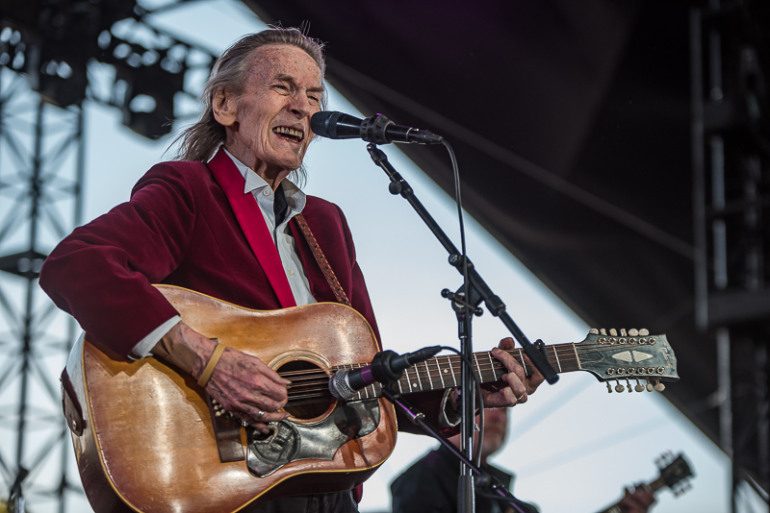Born in Orillia, Ontario, in 1938, Lightfoot began performing in his grade school years where he learned piano as a preteen and taught himself to play guitar in high school. Lightfoot moved to California to study jazz composition in college but grew homesick and returned home to Toronto shortly thereafter.
In 1960, the musician joined Swinging Eight, who are a vocal group that often appeared on the TV series Country Hoedown. Lightfoot also formed the short-lived duo the Two Tones with Terry Whalen. Lightfoot’s songwriting shifted after he heard Bob Dylan in the early ’60s. Inspired by his poetic lyrics, Lightfoot started to compose more personal songs, eventually catching the ear of manager Albert Grossman, who went on to sign him.
Folk groups like Peter, Paul and Mary and country artists like Marty Robbins were among those who recorded some of Lightfoot’s earlier songwriting efforts like “Early Morning Rain,” “For Lovin’ Me,” and “Ribbons of Darkness.” Based on his early success, Lightfoot released his debut album, Lightfoot!, in 1966 and followed it with three more studio LPs for United Artists. In 1976, the songwriter released his popular Summertime Dream LP, which contained the single “Wreck.”
Lightfoot often kept a capo on the second fret of his guitar to stay within his vocal range, pushing himself to get creative with the songs he could write within that key. Most of his collaborators and studio session musicians were happy to adjust, too, much to his bewilderment.
“I could never come to terms with the fact that I would have to walk into a recording studio and tell a guitar player to get ready to play in the key of F# or the key of B. I was embarrassed about that,” Lightfoot told American Songwriter in 2008. “I once had to ask Vassar Clements if he could please tune his fiddle down a half tone so I could play a song in E flat. And he just did it! He just tuned ’er down and away we went.”
Although Lightfoot’s music diminished in the ’80s, his career underwent a resurgence when the artist released 1993’s Waiting for You and 1998’s A Painter Passing. Lightfoot followed those with a live album, titled All Live in 2012, where it was recorded at Toronto’s Massey Hall, where the musician had been headlining annual shows since the late ’60s. Lightfoot was inducted into the Canadian Music Hall of Fame in 1986.
In 2002, Lightfoot experienced an abdominal aortic aneurysm and spent six weeks in a coma. He went to recovery and release his studio album Harmonyin 2004, which he recorded the music before falling ill. Lightfoot’s last album, Solo, came out in 2020 and earlier this year, Lightfoot canceled a string of dates for health reasons, which were not specified at the time.
Upon learning of Lightfoot’s death, many musicians and public figures paid tribute to the late musician, including Billy Joel, Bryan Adams, Brian Wilson, Jason Isbell, the New Pornographers’s A.C. Newman, and Stephen King.
Prime Minister Justin Trudeau went on Twitter to offer his condolences to those who are affected by Lightfoot’s death.
We have lost one of our greatest singer-songwriters. Gordon Lightfoot captured our country’s spirit in his music – and in doing so, he helped shape Canada’s soundscape. May his music continue to inspire future generations, and may his legacy live on forever. To his family,…
— Justin Trudeau (@JustinTrudeau) May 2, 2023
“We have lost one of our greatest singer-songwriters. Gordon Lightfoot captured our country’s spirit in his music – and in doing so, he helped shape Canada’s soundscape. May his music continue to inspire future generations, and may his legacy live on forever. To his family, friends, and many fans across the country and around the world: I’m keeping you in my thoughts at this difficult time.”

